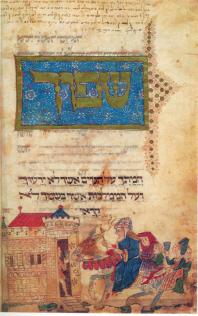Every week, parshaoftheweek.com brings you a rich selection of material on parshat hashavua, the weekly portion traditionally read in synagogues all over the world. Using both classic and contemporary material, we take a look at these portions in a fresh way, relating them to both ancient Jewish concerns as well as cutting-edge modern issues and topics. We also bring you material on the Jewish holidays, as well as insights into life cycle rituals and events...
The ongoing kerfuffle (and for some reason that’s not a Yiddish word; it so should be!) surrounding Iran’s nuclear ambitions, America’s response, and Bibi’s intervention in Congress, is certainly troubling. I have been unhappy with Bibi’s behavior throughout. Right or wrong – and he seems to be right – could he not figure out a way to get the message across without antagonizing the White House and its supporters? Isn’t that exactly what getting the message across means: actually getting the right people to agree with you, and not just pointing out that they are wrong?
I think we can all agree that Iran presents a seriously dangerous threat to regional and world peace, and is responsible, directly and indirectly, for much of the horror that is ravaging the middle east right now, but does Netanyahu’s ongoing crying of wolf – even though the wolf really is here – do any good? Is he right to be so annoyingly and undiplomatically insistent about the threat to Israel and the world which Iran poses?
One of the most interesting and dramatic parts of the Haggadah which we will recite at the Seder this Friday night is the Pour out thy Wrath section. Made up of verses from Psalms and Lamentations, this paragraph, which is extremely politically incorrect, and makes many uncomfortable, asks God to pour his anger out on the nations who have devoured Jacob (the people of Israel) and whose habitation (the land of Israel) they have desolated, and, in turn, destroy them. The custom is to pour an extra fifth cup of wine for Elijah the prophet when we say this section (mirroring nicely the “pouring out” of God’s wrath), send someone to open the front door, and stand to welcome Elijah. Now, Elijah is traditionally understood as the harbinger of the redemption, announcing and accompanying the arrival of the Messiah. It would seem, therefore, that this section, as do other parts of the Haggadah, rather than looking back at the Egyptian exodus, looks forward, to the redemption we eagerly anticipate.
That redemption, the messianic age which Eliyahu will usher in, is founded upon God’s anger, and is predicated on His destruction of those nations who devour and despoil; the end of organized, state-sponsored, predatory evil. Our opening the door to Elijah is an interesting inversion of the original Passover service, in Egypt. There, we huddled inside our homes, which we marked as Jewish by placing the blood of the Pessach lamb on the outer doorposts, so that God would peacefully pass over them as he went about His business of killing the first-born Egyptians in their homes, so we could then be led out of Egypt. Today, at the Pour out thy Wrath section, we do the opposite: we open the doors of our homes to welcome Eliyahu and the Messiah, and show our lack of fear, our faith that God will, indeed, show His anger to the despoilers of the world and destroy them, and thereby save and redeem us. We open our doors, cups in hand, as if to toast this cataclysmic, earth-shattering, game-changing event, this final upheaval of redemption, and, symbolically, be a part of it, join in it, unafraid.
I would argue that, perhaps, Bibi is doing something similar. For the world to be redeemed, evil must be recognized. We must actively and fearlessly step out of our comfort zone – open the doors of our homes – and say unpleasant things, which many would much rather not hear. We must name names, call out the evil ones who would devour, consume, and despoil the innocent, and understand that only by doing so can the world be redeemed, or, to put it in a more contemporary way, saved from racist, imperialist, apparently blood-thirsty, lunatics.
If someone thinks Bibi could have perhaps done this with a bit of finesse, and accomplished more by being more diplomatic or politically astute, I am happy to hear suggestions as to how, because I do agree that the way he did it seemed somewhat clumsy, and certainly antagonized people whom we would rather, if possible, have on our side. If someone thinks that Iran does not fall into the category of evil powers referred to by the Haggadah in this section, who must be called out and opposed, well, you will have to convince me. Their words and deeds, on a daily basis, seem to clearly place them on Eliyahu’s, and God’s, hit-list. In the meantime, this Friday night, when we open our doors, cups of wine and Haggadot in our hands, to greet Eliyahu, Messiah, and a wrathful redemption, ushering in an end to evil, remember that Bibi may well have gotten there before you.
חג שמח
Rabbi Shimon Felix



Get inspired by Pesach Divrei Torah from previous years